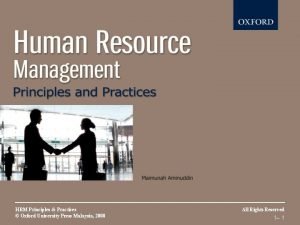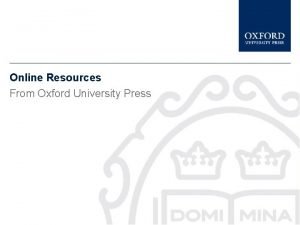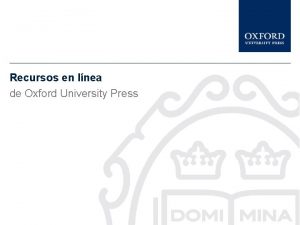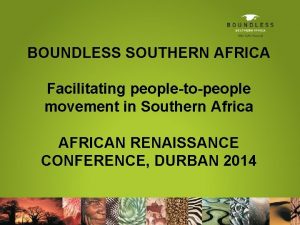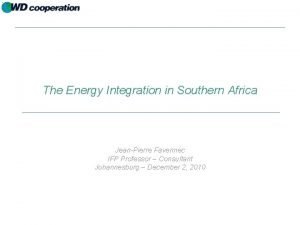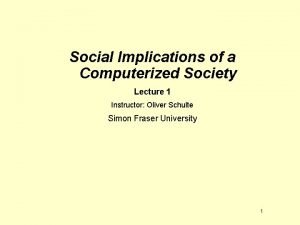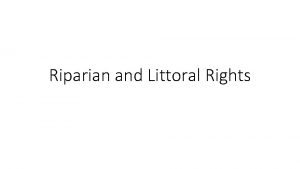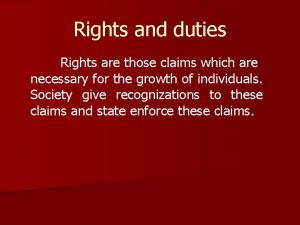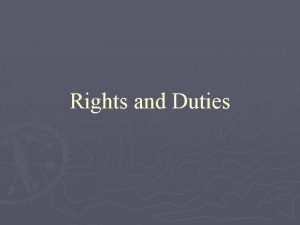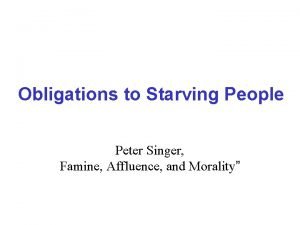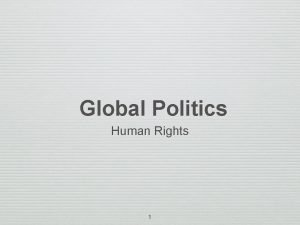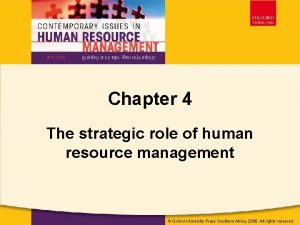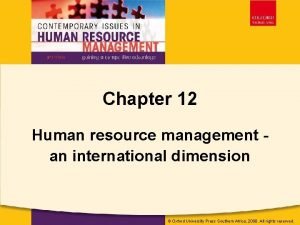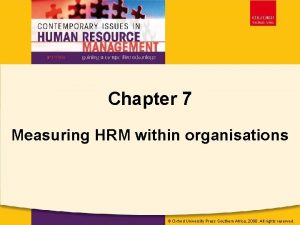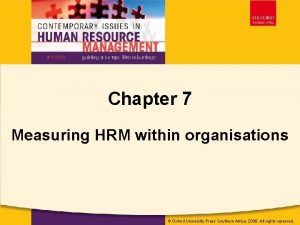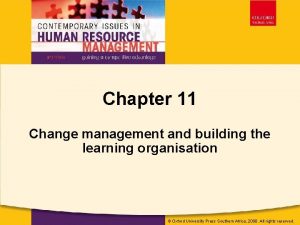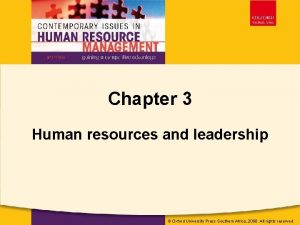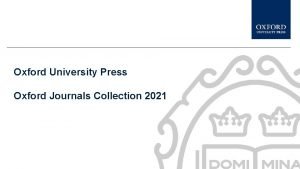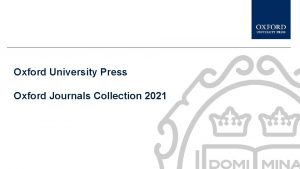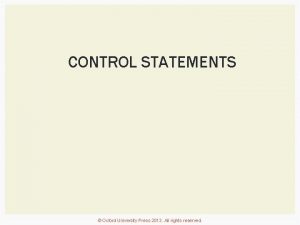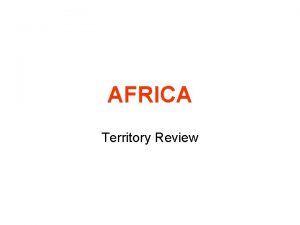Oxford University Press Southern Africa 2008 All rights



























- Slides: 27

© Oxford University Press Southern Africa, 2008. All rights reserved. Chapter 8 Ethical issues and challenges in HRM © Oxford University Press Southern Africa, 2008. All rights reserved.

© Oxford University Press Southern Africa, 2008. All rights reserved. Learning outcomes After reading this chapter you should be able to: • define the concepts of ‘ethics’ and ‘business ethics’ • identify and discuss the ethical dimensions of a strategic HRM paradigm • explain the ethical decision-making frameworks of utilitarianism, Kantian deontology, justice and rights and be able to apply them to the HR function and activities • identify and discuss issues that arise in the employment relationship from the perspective of utilitarianism, Kantian deontology, justice and rights • discuss the role of HR professionals in the management of corporate ethics programmes

© Oxford University Press Southern Africa, 2008. All rights reserved. Chapter Content • • • Opening case: Voluntary Resignations at Orbolay Introduction ethics and its relevance ethical dimensions of a strategic HRM paradigm ethical decision-making frameworks role of HR professionals in the management of corporate ethics programmes and corporate ethics cultures

© Oxford University Press Southern Africa, 2008. All rights reserved. Ethics and the SA business environment • most definitions characterise ethics as referring to standards of conduct or codes of conduct for specialised groups • term is also used to denote the field of moral philosophy (concerned with principles of conduct that govern behaviour) • theories or principles provide the ultimate ground of justification for our ethical beliefs about right and wrong behaviour • Peter Singer: ethics deals with values, with good and bad, with right and wrong. We cannot avoid involvement in ethics for what we do and we don’t do is always a possible subject of ethical evaluation. Anyone who thinks about what he or she ought to do is, consciously or unconsciously, involved in ethics.

© Oxford University Press Southern Africa, 2008. All rights reserved. Business ethics • focuses on moral standards as they apply to organisations and the behaviour of organisational members • requires an integrated approach to decision-making • if ethics is about relationships between people then business ethics is about relationships between stakeholders and the recognition that their divergent interests must be accommodated • different levels of analysis (the individual, the organisational, the professional, the business system and societal levels)

© Oxford University Press Southern Africa, 2008. All rights reserved. Business ethics • two important anchors in South African-based public and private enterprises – the Constitution - founding values of human dignity, the achievement of equality, and the advancement of human rights and freedom – the King (II) Report on Corporate Governance - instrumental in moving ethics onto the agenda of corporate boards in South African-based enterprises

© Oxford University Press Southern Africa, 2008. All rights reserved. Ethical dimensions of a strategic HRM paradigm • 2 problems: – dual loyalties – the role of the HR professional in an integrity based approach to strategic business partnership

Ethical dimensions of a strategic HRM paradigm aims of the traditional welfare aims of a new strategic role problems arise because the transformation of the HR function has left unresolved tensions between admin & service roles

© Oxford University Press Southern Africa, 2008. All rights reserved. Ethical dimensions of a strategic HRM paradigm • emphasis on strategic HRM heightens the potential conflict of loyalties for HR professionals who have to balance their dual membership in the HR profession grounded in the values of ‘fair and efficient’ management of people and in the corporate environment focused on values which have more to do with economic rationalism • HR function has developed out of a concern for the individual, the enterprise and society in response to relevant management and social problems of the day • HR practices have been driven by multiple values including efficiency, competitiveness, care, respect for individuals, rights and justice

© Oxford University Press Southern Africa, 2008. All rights reserved. Ethical dimensions of a strategic HRM paradigm • as long as HR professionals are concerned with both the management of systems and the management of people, it is difficult to see how they could give up any one of these values • operationalising the proper balance between conflicting values remains complex and goes to the heart of strategically managing human resources with integrity • to be regarded as a profession, HR practitioners must have a degree of independence commensurate with them exercising critical analyses of corporate policies and practices in the service of the public good

© Oxford University Press Southern Africa, 2008. All rights reserved. Dual loyalties • conflict between ‘friends of the workers’ and new role as management’s instruments of competitive advantage • 3 examples: 1. unrealistic/overly aggressive business objectives and deadlines to be met (causing organisational members to compromise their companies’ ethical standards) 2. Schwoerer, May & Benson’s study: “many organisations report difficulty establishing a balanced and coherent strategy between employee and employer rights” 3. Hendry: difficult to act as a “neutral go-between” and HR manager “became more unequivocally the representative of management, counter-balancing the power of trade unions and individual rights enshrined in legislation”

© Oxford University Press Southern Africa, 2008. All rights reserved. Dual loyalties • Hendry: – workers and management have different interests • developing strategies and policies that protect employee interests (whilst balancing operational and human resource needs) is a difficult mandate, it requires HR professionals to quantify the contribution of human resources to organisational performance in ways that do not compromise respect for, and the dignity of, individual organisational members

© Oxford University Press Southern Africa, 2008. All rights reserved. HR professional codes of conduct • serve as “moral anchors” - embody a profession’s values, help it to establish an ethical climate and provide a framework for evaluating alternative courses of action • reassure stakeholders (the public, employees, managers and shareholders) that a profession’s activities are underpinned by moral principles, and provide stakeholders with a benchmark by which to evaluate the ethical performance of a profession

© Oxford University Press Southern Africa, 2008. All rights reserved. HR professional codes of conduct • Traditionally - loyalty is owed to affected stakeholders in the following order of priority: the public (including employees and consumers), the profession, the client/employer, and the individual professional • HR professional bodies: – SHRM – Australian Human Resources Institute (AHRI) – South African Board for Personnel Practice (SABPP)

© Oxford University Press Southern Africa, 2008. All rights reserved. HR professional codes of conduct • codes were revised: – SHRM & AHRI by-passed the issue of dual loyalties - now refer to standards and values (advancing the profession, honesty, integrity, confidentiality, justice, competence, lawfulness and organisational capability) – SABPP addresses issues in their code: § dual loyalty § obligation of HR professionals to uphold respect for the dignity of all human persons and empowers them to be vigilant and aggressive in this pursuit § hold in tension the plurality of values it has inherited from multiple traditions (not only including HRM paradigms, but also South Africa’s Constitution) § important vehicle for providing direction and counsel to the HR profession in South Africa

© Oxford University Press Southern Africa, 2008. All rights reserved. An integrity-oriented approach to strategic business partnership • roles undertaken by HR professionals - corporate ethics • study by SHRM & the Commerce Clearing House (CCH) • HR literature - emphasis on the administrative-service role frustrates a transformation of the HR function • Business ethics - law specifies an ethical minimum and that ethics involves more than minimal legal compliance • emphasis on legal compliance – reasons • strategic HRM paradigm calls for HR professionals to move beyond the roles of “policy police and regulatory watchdog”, to business partner

© Oxford University Press Southern Africa, 2008. All rights reserved. An integrity-oriented approach to strategic business partnership • • problems with HR being a business partner integrity-based business partners combine concern for the competitive use of human capital with managerial responsibility for the ethical dimensions of an enterprise’s strategic operations • without an integrity-oriented approach to business partnership, there is the danger that HR professionals may continue in the administrative-service role under the guise of being a strategic player

Moral Rights Individual entitlements which impose obligations on others. © Oxford University Press Southern Africa, 2008. All rights reserved. Ethical decision-making frameworks Utilitarianism (consequentialism) The greatest good for the greatest number (net utility) (Teleological theory) Moral Rights Individual entitlements which impose obligations on others Kantian Duty (nonconsequentialism) Universal respect for autonomous beings (Deontological theory) Justice Due process and due outcome Rawls’s Egalitarianism: Fair distribution of benefits and burdens Nozick’s Entitlement Theory: Uphold property rights and liberty

© Oxford University Press Southern Africa, 2008. All rights reserved. Consequences of actions: teleological theory • consequences which result from an action or practice – consequentialism • utilitarianism – the right thing to do is that which maximises the greatest good for the greatest number of people • act utilitarianism and rule utilitarianism - decides right and wrong on the basis of the consequences of an action – difference is between whether a utility analysis should be applied to every action whenever it occurs (act utilitarianism) or to classes of actions (rule utilitarianism) – example - breaking a contract

© Oxford University Press Southern Africa, 2008. All rights reserved. Consequences of actions: teleological theory • Egoism - the right action is that which maximises selfinterest • Ubunthu - principle of reciprocity and interdependence. Mbiti translates the term as “I am, because we are; and since we are, therefore I am”.

© Oxford University Press Southern Africa, 2008. All rights reserved. The importance of duty to others: deontological theory • nonconsequentialist • emphasises the concept of duties and challenges • management to treat every stakeholder with respect and integrity rather than viewing them instrumentally for the collective good • human rights and justice • Kant – human reason could “work out a consistent set of moral principles that cannot be overridden” – 3 key characteristics of reason: • consistency which requires that moral actions must not be self-contradictory • universality which requires that we treat others the way we want to be treated and not make an exception in matters relating to ourselves • it is a priori, or not derived from

© Oxford University Press Southern Africa, 2008. All rights reserved. The importance of duty to others: deontological theory • Kant – a moral principle/law must follow a particular form: (i) must be possible for it to be made consistently universal (ii) respect rational human beings as ends in themselves (iii) respect the autonomy of rational beings • Ross – prima facie duties require managers to choose between conflicting duties on the basis of which is the more fundamental or obligatory

© Oxford University Press Southern Africa, 2008. All rights reserved. Fairness: the idea of justice • justice - expressed in terms of fairness and equality • issues involving questions of justice are divided into four categories: – distributive – procedural – retributive – compensatory

© Oxford University Press Southern Africa, 2008. All rights reserved. Individual entitlements: rights • to claim a right is to claim that one is ethically entitled to something and this places a duty on other people to act (or refrain from acting) in a way which brings about the fulfillment of one’s right • classified as either negative or positive: – negative rights are liberty rights (e. g. the right to privacy) – positive rights are claim or welfare rights (e. g. the right to employment at a living wage) • most specific rights are derived from the 3 major Lockean rights of life, liberty and property • criticism – opens the way for people to claim a right to ‘anything and everything’ • employee rights and HR activities

© Oxford University Press Southern Africa, 2008. All rights reserved. Convergence across normative ethical theories • discussion of ethical theory generates four key questions that HR managers can usefully employ to evaluate prospective responses to ethical challenges and dilemmas they may face. These questions are as follows: – Who is affected and how? Which action will result in the greatest good for the greatest number of people affected by it? (utilitarianism) – Is the action one that universally respects autonomous rational beings as ends in themselves? (Kantian deontology) – Is the action one that treats all stakeholders fairly? (justice) – Is the action one that upholds fundamental human rights? (rights)

© Oxford University Press Southern Africa, 2008. All rights reserved. Ethical issues and challenges in the workplace • selection – screening – employment interview – psychological testing • compensation • promotion and performance management

© Oxford University Press Southern Africa, 2008. All rights reserved. The role of HR professionals in the operationalisation of corporate ethics programmes • corporate ethics programmes – responsibility for corporate ethics programmes has been assigned to existing functional areas of management, primarily HR departments in Australia, Canada, South Africa and the U. S. A. , and legal departments or corporate services in the U. K. – to be effective, corporate ethics programmes must have the support of top level management
 Oxford university press south africa
Oxford university press south africa Oxford university press 2019 answers
Oxford university press 2019 answers M.swan (oxford university press)
M.swan (oxford university press) Strlen(“oxford university press”) is
Strlen(“oxford university press”) is Oxford university press malaysia
Oxford university press malaysia Oxford university press
Oxford university press Oxford university press
Oxford university press 2008 2008
2008 2008 Umbongo nongqawuse
Umbongo nongqawuse Chapter 24 southern africa
Chapter 24 southern africa Volvo group southern africa
Volvo group southern africa Boundless southern africa
Boundless southern africa Seamless southern africa
Seamless southern africa Chartered secretaries southern africa
Chartered secretaries southern africa Southern africa
Southern africa Ketobe knob utah
Ketobe knob utah Cambridge university press 2011
Cambridge university press 2011 Vilnius university press
Vilnius university press Cambridge university press 2011
Cambridge university press 2011 Positive rights vs negative rights
Positive rights vs negative rights What is littoral rights
What is littoral rights Legal rights and moral rights
Legal rights and moral rights Legal rights vs moral rights
Legal rights vs moral rights Negative rights vs positive rights
Negative rights vs positive rights Negative right
Negative right Positive rights vs negative rights
Positive rights vs negative rights Negative right
Negative right Name 3 points
Name 3 points




